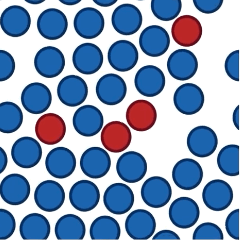Danny Raj M (PI)

Education and career
After completing my bachelors (B.Tech) in Chemical engineering from AC Technology, Anna University, India (2007-2011), I went to IIT Madras where I acquired a dual degree MS and PhD from the department of Chemical engineering (2011-2017). After my Phd, I stayed there for a year as a postdoc, where I worked on setting up spinning disk atomizer experiments for high throughput droplet generation and later collaborated with GE and developed hybrid process models for Chemical processes in a metal-processing industry.
I am a recipient of the INSPIRE faculty award (July 2017 call), a DST initiative for budding, prospective faculty candidates to work in leading institutions. I am currently (April 2018- present) hosted in the department of chemical engineering as an INSPIRE faculty where I collaborate with faculty in different departments, mentor students, while carrying out independent research.
Area of research
I work in the area of complex systems engineering where I study systems that are made up of many interacting entities or what I call 'agents'. Examples range from an ensemble of droplets in a micro-channel to a flock of birds; and pedestrian movement to the spread of an epidemic. Systems such as these, often exhibit a behavior or a phenomenon that is collective in nature---characteristic of the whole. In numerous occasions, understanding or engineering these systems becomes a challenge, because the connections between the agents that make up the system and the observed group-level behavior are non-trivial. From a scientific perspective, I find it interesting to understand how a group of agents give rise to the observed behavior. At the same time, from an engineering perspective, I am interested in solving inverse problems where I want to find out if the agent-interaction or behavior can be altered, or surroundings carefully designed to orchestrate a particular behavior depending on the application at hand.
To comprehend how these systems work, I employ a complex systems approach to modeling, where the system is studied as a collection of interacting agents. In this approach, the agents are not studied in isolation, but considered in relation to other agents and the environment with and through which they interact. All the interactions and the resulting change in states can be put together using an agent based model (ABM) - which integrates the agent -level information to explain the observations at the collective-level. In my research, I apply this modeling strategy in combination with techniques from systems engineering like optimization, model based feedback control, etc., along with simple experiments, to understand and engineer the collective nature of three distinct systems: droplets, organisms and traffic.
I am also interested in modeling, in general, that involves deriving equations that explain the dynamics of the system of interest (which are not necessarily complex). In the past, I have been involved in modeling Chemical engineering equipment for industries (GE, Orchid Pharma,...). Recently, when the COVID-19 pandemic started to spread in India, my wife and I (during lockdown) developed a Network model to simulate the spread of the virus and test the effectiveness of several policies.
For prospective students
Students who are interested in the work I do, and are looking for a position my lab, are encouraged to write to me, with your resume attached. Kindly specify the topics that you are interested in and why you desire to work with me.
At this point in time, the work I do is purely computational in nature. Hence, I consider only applications from students who are mathematically minded. Typically, students with an Engineering or a Physics degree should be able to work on the problems that I am generally interested in.


